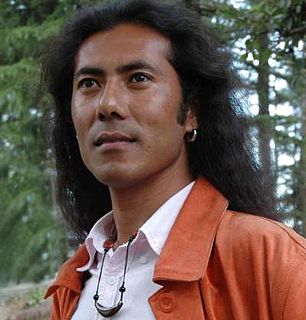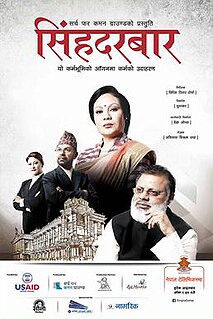Related Research Articles

The Sherpa are one of the Tibetan ethnic groups native to the most mountainous regions of Nepal, Tingri County in the Tibet Autonomous Region and the Himalayas. The term sherpa or sherwa derives from the Sherpa language words ཤར shar ("east") and པ pa ("people"), which refer to their geographical origin of eastern Tibet.

Music of Nepal refers to the various musical genres played and listened to in Nepal. With more than fifty ethnic groups in Nepal, the country's music is highly diverse. Genres like Tamang Selo, Chyabrung, Dohori, Adhunik Geet, Bhajan, Filmi music, Ghazal, Classical music, songs and Ratna music are widely played and popular, but many other less common genres are yet to be cataloged. Western musical genres like Rock, Metal, Hip-Hop, Rap, R&B also regularly feature on the Nepalese music charts. Most of the country's musical bands are based in the Kathmandu valley. Musical genres from Tibet and India have greatly influenced Nepalese music.

Nepali Cinema, also referred to as Kollywood or "Nepali Chalachitra" in Nepali, is the filmmaking industry in Nepal. This includes films in various languages of Nepal, most notably in Nepali, Maithili and Bhojpuri. The term Kollywood is also used, as a portmanteau for films produced in the Nepali language while the Nepalese films produced from Kathmandu and Janakpur in the Maithili language is known as Mithilawood. Both of these film industries are the largest viewing cinema of Nepal and are collectively known as Kollywood.
Mask of Desire is a 2000 Nepali film directed by Tsering Rhitar Sherpa. It was Nepal's submission to the 73rd Academy Awards for the Academy Award for Best Foreign Language Film, but was not accepted as a nominee.

Sushma Joshi is a Nepali writer, filmmaker based in Kathmandu, Nepal. Her fiction and non-fiction deal with Nepal's civil conflict, as well as stories of globalization, migration and diaspora.
The Hyolmo are an people mainly from the Eastern and Northern Himalayan Regions of Nepal. They refer to themselves as the "hyolmo" or "Yolmopa" and are native residents of the Helambu valleys and the surrounding regions of Northeastern Nepal. Their combined population in these regions is around 11,000. They also have sizeable communities in Bhutan, Darjeeling, Sikkim and some regions of South-Western Tibet. They are among the 59 indigenous groups officially recognized by the Government of Nepal as having a distinct cultural identity and are also listed as one of the 645 Scheduled Tribes of India.

Lobsang Wangyal is a writer, social activist, photojournalist, and events producer, based in McLeod Ganj, Dharamshala, India. He has been a stringer reporter and photographer for Agence France-Presse for many years.

Tenzing Sonam is a Tibetan film director, writer and essayist. He works through his production company, White Crane Films, which he runs with his partner, Ritu Sarin.
The National Film Awards is the most prominent and prestigious award of Nepali cinema. The first National Film Award was held in 2005, in the presence of His Majesty's King Gyanendra Bir Bikram Shah. The event is held at the residence of the president of Nepal and the president gives the awards to the winners in various categories. It is yearly organised by Film Development Board, Nepal.

On 18 April 2014, seracs on the western spur of Mount Everest failed, resulting in an ice avalanche that killed sixteen climbing Sherpas in the Khumbu Icefall. This was the same icefall where the 1970 Mount Everest disaster had taken place. Thirteen bodies were recovered within two days, while the remaining three were never recovered due to the great danger of performing such an expedition. Many Sherpas were angered by what they saw as the Nepalese government's meager offer of compensation to victims' families, and threatened a protest or strike. On 22 April, the Sherpas announced they would not work on Everest for the remainder of 2014 as a mark of respect for the victims.

Kalo Pothi: The Black Hen is a 2015 Nepali drama film directed by Min Bahadur Bham and produced by Anna Katchko, Tsering Rhitar Sherpa, Min Bahadur Bham, Debaki Rai, Catherine Dussart and Anup Thapa.

Singha Durbar is a 2015 Nepalese television series. It revolves around the story of Nepal's first Female Prime Minister who undergoes various challenges in her quest to establish a governance system of transparency, accountability and collaborative leadership

White Sun or Seto Surya is a 2016 drama war biographical film directed by Deepak Rauniyar. Written by Deepak Rauniyar, David Barker and Produced by Joslyn Barnes, Danny Glover, Tsering Rhitar Sherpa, and Deepak Rauniyar, under the banner of Aadi Productions with Louverture Films, The Bertha Foundation, Doha Film Institute, The Film Kitchen, Hubert Bals Fund, Mila Productions, Netherlands Fund for Film and Worley Works. The film stars Dayahang Rai and Rabindra Singh Baniya in the lead roles alongside Asha Magrati, Sumi Malla, Amrit Pariyar, Deepak Chetri and Deshbhakta Khanal. The film is based on Nepalese Civil War's conflict between royalists and Maoists.
Min Bahadur Bham is a Nepalese film director. He has won various awards including the National Film Award for Best Writer, the Norwegian Sorfond Award at the Cannes Film Festival, and the Fedeora Award at the Venice Film Festival.

Surya Kumar Neupane known professionally as Uttam Neupane, is a Nepali sound mixer. He is the recipient of the 5th National Film Award of Nepal for Best Sound mixing for the feature film Mero Euta Saathi Chha. Two films he did sound-mixing for, Bulbul and Talakjung vs Tulke, were Nepal's official entries for the 92nd and 88th Academy Awards respectively.
Pema Dhondup Gakyil, who is professionally credited as Pema Dhondup, is a Tibetan film director and actor. He directed and produced We're No Monks (2004) and The Man from Kathmandu (2019), and he provided voiceovers for Tenzin in the Uncharted series of video games. He has resided in Los Angeles, California, since 2004.

Suntali is a 2014 Nepali black-comedy film, directed by Bhaskar Dhungana. The film is produced by Bhaskar Dhungana, Jaya Shah, and Prachanda Shrestha under the banner of Blue Poppy Films. It stars Priyanka Karki, Karma Shakya, Sushma Karki, Bipin Karki, and Pramod Agrahari. The film follows Suntali's relationship with Sundar.

Sallipir is a Nepali novel by Nayan Raj Pandey. It was published on April 30, 2016 by FinePrint Publication. It is the author's seventh novel. The writer's previous works, Loo and Ular had been widely successful. Unlike, the author's previous works which were set in the southern plains of midwestern region, this book is set in the Khumbu region in the Himalayan.
Abinash Bikram Shah is a Nepalese director, writer and producer. He is the first Nepalese filmmaker to be officially selected for Cannes Film Festival, where his short film Lori was selected to compete for Short Film Palme d'Or at 2022 Cannes Film Festival, and won Special Jury Mention.
References
- ↑ "Second Inner Path festival to celebrate Buddhism concluded". News Track India. 13 September 2013. Retrieved 27 December 2013.
- ↑ "Tsering Rhitar Sherpa". IMDb. Retrieved 2014-05-06.
- ↑ "The Spirit Doesn't Come Anymore". Mila Productions - Films. Retrieved 2014-05-06.
- 1 2 Soham Dhakal (2007). "Interview with Tsering Rhitar Sherpa". .: Suskera :. Retrieved 2014-05-06.
- 1 2 "Recognition for Nepali Cinema". Nepal Film Producer's Association. Retrieved 2014-05-06.
- ↑ "Mask of Desire -". Nepali Times. No. 7. 2000-08-30. Retrieved 2014-05-06.
- ↑ "Mukundo". Mila Productions - Films. Retrieved 2014-05-06.